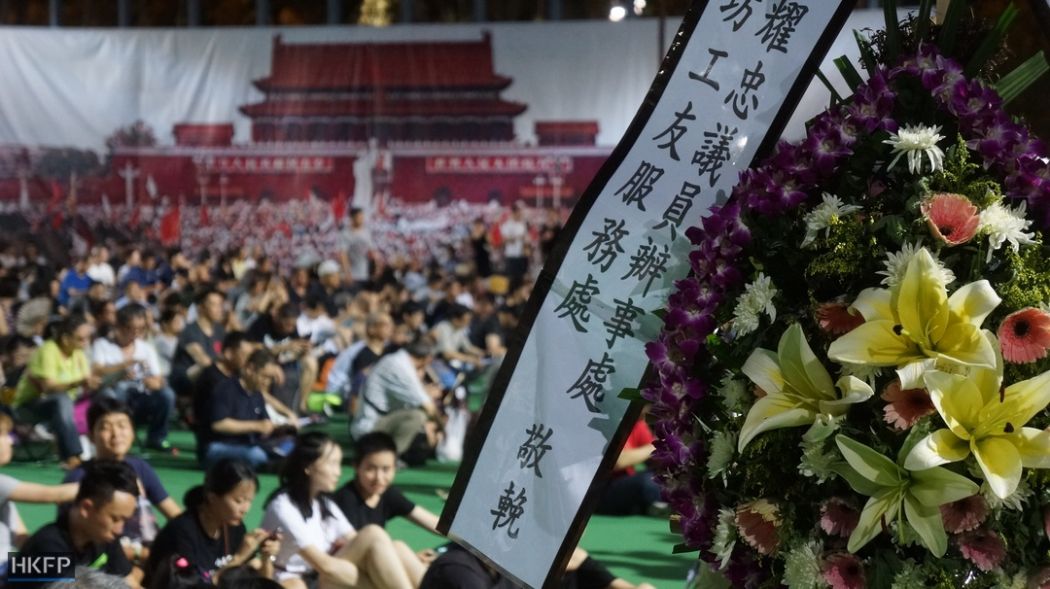Chief Executive Carrie Lam invoked the national security law and Covid-19 restrictions when asked on Tuesday about the legality of Hongkongers commemorating the 1989 Tiananmen crackdown.

At her weekly press briefing, the incumbent leader did not clarify which part of the Beijing-enacted legislation would restrict residents from gathering to remember those who died in the crackdown: “Any public activity in Hong Kong, regardless of the purpose, has to fulfil the requirements in the law. As far as any gathering is concerned there are a lot of legal requirements – there is the national security law, there is the social distancing restrictions under Cap. 599, and there is also a venue question,” she said.
See also: Explainer: How Hong Kong sought to erase the memory of the 1989 Tiananmen Massacre
She was asked whether anyone gathering in Victoria Park – the traditional site of a remembrance vigil – would face legal consequences, and where the “red lines” were in terms of those who wished to privately commemorate the crackdown.

When HKFP asked the Chief Executive Office to clarify which part of the security law may forbid a commemorative gathering, the enquiry was passed on to the Security Bureau.
A spokesperson said that free speech and free assembly are protected: “However, freedom of speech and freedom of assembly are not absolute, and can be subject to restrictions prescribed by law that are necessary for, amongst other reasons, protection of national security, public order or public health.” They added that all must abide by the law “including the National Security Law, the Public Order Ordinance and the Prevention and Control of Disease Ordinance” and any offence would depend upon the circumstances and evidence.
Barometer of free speech
Commemorating June 4 is often seen as a barometer of free speech in Hong Kong with often over 100,000 gathering in Causeway Bay’s Victoria Park for a candlelit vigil. However, since last year, the June 4 museum has been confiscated, activists arrested, masses cancelled and campus monuments torn down.
The government has banned the annual vigil, which was organised by the now-defunct Hong Kong Alliance in Support of Patriotic Democratic Movements of China, for the past two years, citing public health reasons amid the pandemic.
In 2020, many Hongkongers defied the ban and went ahead with the commemoration. A number of prominent veteran activists, such as Lee Cheuk-yan, Albert Ho and Chow Hang-tung, have been jailed for organising or taking part in an unauthorised assembly.
This year could be the first without any public activities in Hong Kong to mark the anniversary. Last week, it emerged that the vigil site’s football pitches had been closed “for maintenance” or fully booked by residents. The Leisure and Cultural Services Department earlier said the pitches could only be reserved for “designated use” due to the Covid-19 pandemic.

Amnesty International and other rights groups have planned events and memorials overseas. Vigils will be held in cities such as San Francisco and Washington DC in the US, Seoul in South Korea, Taipei in Taiwan, Ulaanbaatar in Mongolia, Sydney in Australia, Oslo in Norway, Paris in France, Amsterdam in the Netherlands and London in the UK.
The Tiananmen crackdown occurred on June 4, 1989 ending months of student-led demonstrations in China. It is estimated that hundreds, perhaps thousands, died when the People’s Liberation Army cracked down on protesters in Beijing.

In June 2020, Beijing inserted national security legislation directly into Hong Kong’s mini-constitution – bypassing the local legislature – following a year of pro-democracy protests and unrest. It criminalised subversion, secession, collusion with foreign forces and terrorist acts, which were broadly defined to include disruption to transport and other infrastructure. The move gave police sweeping new powers, alarming democrats, civil society groups and trade partners, as such laws have been used broadly to silence and punish dissidents in China. However, the authorities say it has restored stability and peace to the city.
Support HKFP | Policies & Ethics | Error/typo? | Contact Us | Newsletter | Transparency & Annual Report | Apps
Help safeguard press freedom & keep HKFP free for all readers by supporting our team

























